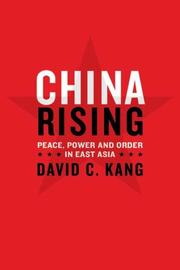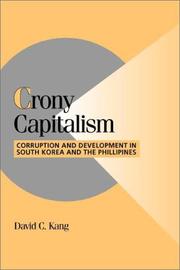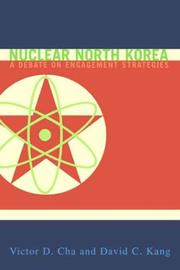| Listing 1 - 10 of 16 | << page >> |
Sort by
|

ISBN: 9780231141888 0231141882 9780231512060 0231512066 Year: 2007 Publisher: New York : Columbia University Press,
Abstract | Keywords | Export | Availability | Bookmark
 Loading...
Loading...Choose an application
- Reference Manager
- EndNote
- RefWorks (Direct export to RefWorks)
"David C. Kang believes certain preferences and beliefs are responsible for maintaining stability in East Asia. Kang's research shows how East Asian states have grown closer to China, with little evidence that the region is rupturing. Rising powers present opportunities as well as threats, and the economic benefits and military threat China poses for its regional neighbors are both potentially huge; however, East Asian states see substantially more advantage than danger in China's rise, making the region more stable, not less. Furthermore, although East Asian states do not unequivocally welcome China in all areas, they are willing to defer judgment regarding what China wants and what its role in East Asia will become. They believe that a strong China stabilizes East Asia, while a weak China tempts other states to try to control the region." "Many scholars downplay the role of ideas and suggest that a rising China will be a destabilizing force in the region, but Kang's argument reveals the flaws in contemporary views of China and the international relations of East Asia and offers a new understanding of the importance of sound U.S. policy in the region."--BOOK JACKET.
China --- East Asia --- Chine --- Extrême-Orient --- Foreign relations --- Politics and government. --- Relations extérieures --- Politique et gouvernement --- Politics and government --- S09/0400 --- S09/0264 --- China: Foreign relations and world politics--China and Asia: general --- China: Foreign relations and world politics--General works: since 1989 --- Asia, East --- Asia, Eastern --- East (Far East) --- Eastern Asia --- Far East --- Orient --- Cina --- Kinë --- Cathay --- Chinese National Government --- Chung-kuo kuo min cheng fu --- Republic of China (1912-1949) --- Kuo min cheng fu (China : 1912-1949) --- Chung-hua min kuo (1912-1949) --- Kina (China) --- National Government (1912-1949) --- China (Republic : 1912-1949) --- People's Republic of China --- Chinese People's Republic --- Chung-hua jen min kung ho kuo --- Central People's Government of Communist China --- Chung yang jen min cheng fu --- Chung-hua chung yang jen min kung ho kuo --- Central Government of the People's Republic of China --- Zhonghua Renmin Gongheguo --- Zhong hua ren min gong he guo --- Kitaĭskai︠a︡ Narodnai︠a︡ Respublika --- Činská lidová republika --- RRT --- Republik Rakjat Tiongkok --- KNR --- Kytaĭsʹka Narodna Respublika --- Jumhūriyat al-Ṣīn al-Shaʻbīyah --- RRC --- Kitaĭ --- Kínai Népköztársaság --- Chūka Jinmin Kyōwakoku --- Erets Sin --- Sin --- Sāthāranarat Prachāchon Čhīn --- P.R. China --- PR China --- Chung-kuo --- Zhongguo --- Zhonghuaminguo (1912-1949) --- Zhong guo --- République Populaire de Chine --- República Popular China --- Catay --- VR China --- VRChina --- 中國 --- 中国 --- 中华人民共和国 --- Jhongguó --- Bu̇gu̇de Nayiramdaxu Dundadu Arad Ulus --- Bu̇gu̇de Nayiramdaqu Dumdadu Arad Ulus --- Bu̇gd Naĭramdakh Dundad Ard Uls --- Khi︠a︡tad --- Kitad --- Dumdadu Ulus --- Dumdad Uls --- Думдад Улс --- Kitajska --- China (Republic : 1949- ) --- PRC --- P.R.C. --- BNKhAU --- БНХАУ --- China - Foreign relations - East Asia --- East Asia - Foreign relations - China --- China - Foreign relations - 1976 --- -East Asia - Politics and government
Book
ISBN: 9780231153188 9780231526746 9780231153195 Year: 2012 Publisher: New York, N.Y. Columbia University Press
Abstract | Keywords | Export | Availability | Bookmark
 Loading...
Loading...Choose an application
- Reference Manager
- EndNote
- RefWorks (Direct export to RefWorks)
East Asia --- Commerce --- History. --- Foreign relations. --- Politics and government. --- J3991.10 --- S10/0610 --- K9461.14 --- K9400.50 --- J4541.14 --- J4300.60 --- Asia: History and geography of East Asia --- China: Economics, industry and commerce--Foreign trade and economic relations: before 1842 --- Korea: International trade and economic relations (South) Korea -- Asia -- China --- Korea: Economy and industry -- history -- Chosŏn period (1392-1910) --- Japan: Economy and industry -- commerce and trade -- international trade, economic relations and policy -- Asia -- China --- Japan: Economy and industry -- history -- Kinsei, Edo, Tokugawa period, early modern (1600-1867) --- International relations. Foreign policy --- S04/0410 --- China: History--General works: Asia
Book
ISBN: 9781107167230 9781316711620 9781316616406 Year: 2017 Publisher: Cambridge, United Kingdom New York, NY Cambridge University Press
Abstract | Keywords | Export | Availability | Bookmark
 Loading...
Loading...Choose an application
- Reference Manager
- EndNote
- RefWorks (Direct export to RefWorks)
East Asia is richer, more integrated and more stable than ever before, whilst East Asian defense spending is now roughly half of what it was in 1990 and shows no sign of increasing. There is no evidence of any Asian arms race. All countries in the region are seeking diplomatic, not military solutions with each other. Yet this East Asia reality still runs counter to a largely Western narrative that views China's rise as a threat and the region as increasingly unstable.The author argues here that American grand strategy should emphasize diplomatic and economic relations with the region, rather than military-first policies. Using longitudinal and comparative data, statistical analysis, and intensive research in selected East Asian countries, he suggests that East Asia is in sync with the American desire to share burdens and that the region may in fact be more stable than popularly believed.

ISBN: 1107124654 1280421401 0511176058 0511041918 0511156782 0511304234 0511606176 0511044550 9780511041914 0521808170 9780521808170 052100408X 9780521004084 9780511606175 9780511044557 9780511156786 9786610421404 6610421404 Year: 2002 Publisher: Cambridge ; New York : Cambridge University Press,
Abstract | Keywords | Export | Availability | Bookmark
 Loading...
Loading...Choose an application
- Reference Manager
- EndNote
- RefWorks (Direct export to RefWorks)
Why has the literature on Asian development not addressed the issue of money politics in Korea? How can we reconcile the view of an efficient developmental state in Korea before 1997 with reports of massive corruption and inefficiency in that same country in 1998 and 1999? Politics is central to the answer. In this book the author makes two arguments. First, both Korea and the Philippines experienced significant corruption throughout the post-independence era. Second, political - not economic - considerations dominated policy making in both countries. Focusing on the exchange of favors for bribes between state and business, the author argues that politics drove policy choices, that bureaucrats were not autonomous from political interference in setting policy, and that business and political elites wrestled with each other over who would reap the rents to be had. Even in Korea, corruption was far greater than the conventional wisdom allows.
Political corruption --- Korea (South) --- Philippines --- Economic policy --- Economic policy. --- Social Sciences --- Political Science
Book
ISBN: 1316731391 1316711625 1316733327 110716723X 1316616401 Year: 2017 Publisher: Cambridge, England : Cambridge University Press,
Abstract | Keywords | Export | Availability | Bookmark
 Loading...
Loading...Choose an application
- Reference Manager
- EndNote
- RefWorks (Direct export to RefWorks)
East Asia is richer, more integrated and more stable than ever before, whilst East Asian defense spending is now roughly half of what it was in 1990 and shows no sign of increasing. There is no evidence of any Asian arms race. All countries in the region are seeking diplomatic, not military solutions with each other. Yet this East Asia reality still runs counter to a largely Western narrative that views China's rise as a threat and the region as increasingly unstable. In this important book, David C. Kang argues that American grand strategy should emphasize diplomatic and economic relations with the region, rather than military-first policies. Using longitudinal and comparative data, statistical analysis, and intensive research in selected East Asian countries, he suggests that East Asia is in sync with the American desire to share burdens and that the region may in fact be more stable than popularly believed.
United States --- East Asia --- Foreign relations --- Security, International --- Collective security --- International security --- International relations --- Disarmament --- International organization --- Peace
Book
ISBN: 1282872435 9786612872433 0231526741 Year: 2010 Publisher: New York : Columbia University Press,
Abstract | Keywords | Export | Availability | Bookmark
 Loading...
Loading...Choose an application
- Reference Manager
- EndNote
- RefWorks (Direct export to RefWorks)
East Asia --- History. --- Commerce --- Foreign relations. --- Politics and government.
Book
ISBN: 1108807402 1108847889 1108846238 1108479871 1108790895 Year: 2020 Publisher: Cambridge : Cambridge University Press,
Abstract | Keywords | Export | Availability | Bookmark
 Loading...
Loading...Choose an application
- Reference Manager
- EndNote
- RefWorks (Direct export to RefWorks)
This innovative volume provides an introduction to twelve seminal events in the international relations of East Asia prior to 1900: twelve events that everyone interested in the history of world politics should know. The East Asian historical experience provides a wealth of new and different cases, patterns, and findings that will expand horizons from the Western, Eurocentric experience. Written by an international team of historians and political scientists, these essays draw attention to the China-centered East Asian order - with its long history of dominance - and what this order might tell us about the current epoch.
International relations --- Diplomatic history --- International history (Diplomatic history) --- World history --- History. --- East Asia --- Foreign relations. --- Politics and government.

ISBN: 1282871919 9786612871917 0231505337 9780231505338 9780231131285 0231131283 9781282871915 6612871911 Year: 2003 Publisher: New York Columbia University Press
Abstract | Keywords | Export | Availability | Bookmark
 Loading...
Loading...Choose an application
- Reference Manager
- EndNote
- RefWorks (Direct export to RefWorks)
Coming to the issues from different perspectives, the authors together have written an essential work of clear-eyed reflection and authoritative analysis. They refute a number of misconceptions and challenge faulty thinking that surrounds the discussion of North Korea, most important, the idea that North Korea is an irrational nation. Cha and Kang contend that however provocative, even deplorable, the North's behavior may at times be, it is not incomprehensible or incoherent.
Korea (North) -- Foreign relations -- United States. --- Korea (North) -- Military policy. --- Nuclear warfare -- Korea (North). --- United States -- Foreign relations -- Korea (North). --- World politics -- 21st century. --- Military & Naval Science --- Law, Politics & Government --- Armies --- Nuclear warfare --- World politics --- Korea (North) --- United States --- Military policy. --- Foreign relations --- Atomic warfare --- CBR warfare --- Nuclear strategy --- Nuclear war --- Thermonuclear warfare --- War --- Nuclear crisis control --- Nuclear weapons --- K9564.11 --- K9570.90 --- K9578.15 --- Korea: International politics, law and relations of North Korea -- North America -- United States --- Korea: Defense and military -- general and history -- North Korea (1945- ) --- Korea: Defense and military -- weaponry -- North Korea
Book
ISBN: 1438427867 1441624090 9781441624093 1438427794 9781438427799 9781438427799 9781438427867 9781438427867 9781438427805 Year: 2009 Publisher: Albany SUNY Press
Abstract | Keywords | Export | Availability | Bookmark
 Loading...
Loading...Choose an application
- Reference Manager
- EndNote
- RefWorks (Direct export to RefWorks)
How the world deals with North Korea and its nuclear capability will have ramifications for both regional and global stability. Engagement with North Korea examines the still controversial policy strategy known as engagement, which aims to persuade rather than force North Korea to be cooperative. While examining the converging and diverging policies of engagement practiced by the United States, China, Russia, Japan, and South Korea, the contributors to this volume uncover how and to what extent engagement has made some form of progress, and under what conditions it is likely to achieve complete success. In addition to the critical topic of denuclearization, the volume also demonstrates that engagement involves the use of negotiations and incentives in both the economic and the security realms. This volume is essential reading for both students and policy makers concerned about denuclearization in the multilateral context.
Nuclear nonproliferation --- Korea (North) --- Korean People's Republic --- People's Democratic Republic of Korea --- Koreĭskai︠a︡ Narodno-Demokraticheskai︠a︡ Respublika --- Korea (North Korean Government) --- Democratic People's Republic of Korea --- North Korea --- KNDR --- Chʻao-hsien min chu chu i jen min kung ho kuo --- Koreai Népi Demokratikus Köztársaság --- Korea (Democratic People's Republic) --- K.N.D.R. --- K.R.L.D. --- Korea (People's Democratic Republic) --- Korean People's Democratic Republic --- Chōsen Minshu Shugi Jinmin Kyōwakoku --- Chosŏn Minjujuŭi Inmin Konghwaguk --- KRLD --- Koreańska Republika Ludowo-Demokratyczna --- Kūriyā al-Dīmuqrāṭīyah --- D.P.R.K. --- DPRK --- Corée du Nord --- República Popular Democrática de Corea --- Corea (North) --- North Korean Interim Government --- Chosun Minchu-chui Inmin Konghwa-guk --- Chaoxian minzhu zhuyi renmin gongheguo --- 朝鲜民主主义人民共和国 --- Foreign relations. --- K9549 --- K9560 --- K9578.15 --- Korea: International politics, law and relations -- North-South relation --- Korea: International politics, law and relations of North Korea -- general, world and transregional --- Korea: Defense and military -- weaponry -- North Korea
Book
ISBN: 1009089617 1009098535 1009115324 1009115529 Year: 2022 Publisher: Cambridge, United Kingdom ; New York, NY : Cambridge University Press,
Abstract | Keywords | Export | Availability | Bookmark
 Loading...
Loading...Choose an application
- Reference Manager
- EndNote
- RefWorks (Direct export to RefWorks)
Neither war nor preparations for war were the cause or effect of state formation in East Asia. Instead, emulation of China-the hegemon with a civilizational influence-drove the rapid formation of centralized, bureaucratically administered, territorial governments in Korea, Japan, and Vietnam. Furthermore, these countries engaged in state-building not to engage in conflict or to suppress revolt. In fact, war was relatively rare and there was no balance of power system with regular existential threats-the longevity of the East Asian dynasties is evidence of both the peacefulness of their neighborhood and their internal stability. We challenge the assumption that the European experience with war and state-making was universal. More importantly, we broaden the scope of state formation in East Asia beyond the study of China itself and show how countries in the region interacted and learned from each other and China to develop strong capacities and stable borders.
State, The. --- Nation-building --- East Asia --- Politics and government. --- Foreign relations. --- Political development --- Stabilization and reconstruction (International relations) --- State-building --- Sovereignty --- Political science --- Administration --- Commonwealth, The
| Listing 1 - 10 of 16 | << page >> |
Sort by
|

 Search
Search Feedback
Feedback About UniCat
About UniCat  Help
Help News
News